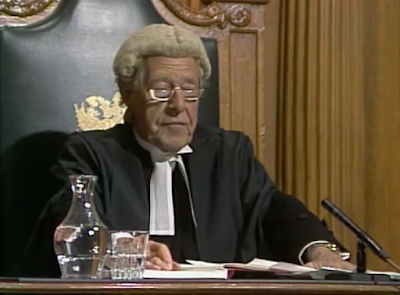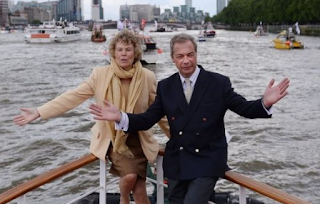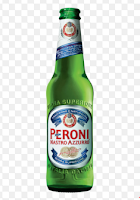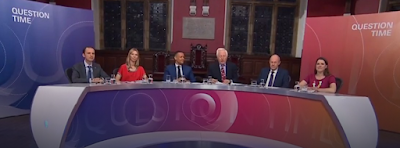Reading
the comments here, I know that most of you will already have heard this...
...but, with massive thanks to you, and, above all, to the tireless efforts of David and Andrew at
News-watch, here's a transcript of
that interview on
this morning's Today programme for posterity's sake.
It began as a simple BBC interview between John Humphrys and Peter Lilley, but the BBC decided to bring in their lead journalist at the BBC's 'divisive and controversial' Reality Check unit, Chris Morris, to 'reality check' pro-Brexit Lord Lilley as the interview proceeded. (A Lord Adonis-like move?)
Big mistake on the BBC's part!
Lord Lilley turned the tables and 'reality checked' Chris Morris, leaving the BBC's 'reality checker' flailing like a EU quota-breaking fish on the deck of the Today studio floor.
An extraordinary, landmark BBC interview then, exposing the absurdity of having a partisan hack (no offence) as the head of a supposedly impartial BBC front-facing reality-checking project...
Cue courtesy-of-News-watch transcript:
*******
Transcript of BBC Radio 4, ‘Today’, 20 November 2018, Interview with Peter Lilley, 8.10am
JOHN HUMPHRYS: So that's it then. Theresa May's political enemies had threatened to unseat her and it hasn't happened. They needed 48 Conservative MPs to sign a letter calling for her to go and they told us those letters were in the bag. It turns out they are not. The dramatic appearance outside the House of Commons last week by the rebels’ leader Jacob Rees-Mogg is looking a little premature at best, a busted flush at worst and another threat to Mrs May from a group of five senior Brexiteer Cabinet ministers demanding changes to her withdrawal deal also seems to have receded, if not disappeared. So is she home free? Well a man who's been a leading Brexiteer for many, many years is Peter Lilley now Lord Lilley and he is with me and I gather Lord Lilley that you were at Number 10 yesterday with some other Brexiteers, you saw Mrs May?
PETER LILLEY: We did, but I'm afraid it was a private meeting . . .
JH: (speaking over) A private meeting.
PL: I’m terribly old fashioned I don't tell you what (words unclear due to speaking over)
JH: (speaking over) Well, just tell us whether she was singing as it were, whether she was doing a little dance of joy.
PL: I didn't see any dances.
JH: Didn't see any dances. Well . . . well that's a shame. But, but the reality is that she is home free now, isn't she? I mean, the rebellion, if we can dignify it as such, that's gone, hasn't it?
PL: I don't know. I'm not in the House of Commons. I'm not an expert on that sort of thing.
JH: But you were for a very, very long time and you're still a loyal Conservative.
PL: Indeed.
JH: And what do you think, I mean, is there any point at this stage in trying to unseat her to continue trying to unseat her?
PL: I didn't realise that's what we were (words unclear due to speaking over)
JH: (speaking over) Oh, sorry I (words unclear due to speaking over) bit of politics . . .
PL: (speaking over) intending to spend time discussing . . . I thought I was her to discuss about trade and . . .
JH: We will do that, we will do that but can I just get your thoughts on that?
PL: No not really I don't have any.
JH: You don't have any you don’t . . .
PL: (word or words unclear) not . . . not of any importance.
JH: You don't by virtue of well, come on, you're a senior politician. But isn't the reality that so long as she stays you're not going to get a different deal?
PL: Well we might if Parliament turns down her present deal and then we will have, I hope, to take up the deal that was offered by Tusk, the President of the European Council, on 7th of March this year when he said that we could have a Canada style deal plus, plus, plus, plus, security cooperation, co-operation on investment and innovation and education and culture and, finally, immediate talks to prevent absurdities like the disruption of air flights once we leave. Sadly, the government turned that down. And the reason they give for turning it down was partly that they were afraid it might not apply to Northern Ireland and, obviously, we would want that for the whole of the United Kingdom, but also because they said a free trade area introduces friction in trade because companies have to fill in custom.. or, you know, lodge customs declarations and declare the origin of their goods. I've published a paper today saying that all these fears, the fears that that would be hugely costly cause disruption interrupt with just-in-time supply chains and undermine economic growth are at best exaggerated and at worst completely imaginary.
JH: But you're not really suggesting, are you, that a new deal, a completely new deal could be negotiated in a few months, the next four months?
PL: It probably could. Because we're in the unique . . . normally free trade deals (fragments of words, or words unclear) take a long time because you’ve got to get rid of 11,000 tariffs . . .
JH: (interrupting) They take years . . .
PL: They, they, on average they take 28 months. But the . . .
JH: (interrupting) Well, the Canada deal took seven years.
PL: Yes, but that's because they started with 10,000 tariffs and they had to negotiate their removal, not just with the other side but with their domestic industries that had become protected behind them. We start with zero tariffs. We want to end with zero tariffs. Tell me how that can take more than 10 minutes to negotiate? The other thing that you have to negotiate is to get your rules and regulations equivalent and remove any that are artificial barriers to trade. That normally takes years and is very difficult. We start with identical rules and regulations. How can that take very long to end up with identical rules and regulations? All you've got to negotiate is a system for dealing when one side or other changes their rules and regulations. That could be done within months, if not we leave on World Trade Organisation terms as we trade with America and many other countries and start negotiating then just as Canada did, but we start where Canada ended up. So it can be done quite quickly.
JH: Well let me tell you then some of the things that the Department for Exiting Europe says needs to be done to import goods in, in a ‘no deal’ scenario basically. Register for a UK economic operator registration and identification number. This is mindbendingly tedious I understand, but nonetheless enormously bureaucratic . . . bureaucratic and has to be done. That is one thing. Ensure their contracts in international terms and conditions of service reflect that they are now (word unclear ‘unimportant’ or ‘an importer’), to consider how they will submit import declarations whether to engage a customs broker, freight forwarder and logistics provider, decide the correct classification and value of their goods and enter this on the custom . . . And so on. It is immensely complicated.
PL: Well, it's not immensely complicated but you're right, there are complexities and you have to trade off the complexities of this which are comparatively minor and tens of thousands of companies do it already, with the advantages of being able to negotiate your own trade deals elsewhere. If it were so hugely damaging, you would expect . . . being in a free trade area rather than a customs union. You would ask yourself, ‘Well why don't countries like Canada, which has a free trade agreement with America; Switzerland, Norway which have free trade agreements with the European Union and similar bodies in Asia. Why don't they want to convert it into a customs union to avoid these problems you've just raised?’ They don't. And so . . .
JH: (speaking over) Why don’t you . . .
PL: So they don't find it too much of a problem. I don't think British businesses are any less competent than Swiss businesses or Canadian businesses.
JH: Well they don't feel very confident about the sort of thing that you're proposing do they? We heard Carolyn Fairbairn, Director General of the CBI yesterday saying that investment is flooding out of Britain as a result of Brexit, in cash that companies are planning into (corrects himself) plowing into ‘no deal’ planning that otherwise would have been put into skills and technology and so on. In other words they are desperate to have a deal and they (fragment of word, or word unclear) they have settled for Mrs May's transition deal?
PL: Can you remind me of an occasion when the CBI ever got it right? They were wrong about the euro. They were wrong about going into the ERM. They were wrong about coming out of the ERM. They were wrong about dealing with the financial crisis a few years ago.
JH: They speak for business.
PL: Well they claim to. Ask them how many paid up members they've got. They won't tell you.
JH: Why . . . why are companies in that case stockpiling goods if they're feeling so confident . . .
PL: (speaking over) Well . . .
JH: . . . why are they stockpiling?
PL: . . . they're being told in large measure not to, for example the government's written to all Health Authorities saying don't stockpile, to all medical, you know, GPs and say, ‘don't stockpile, because we don't think it's necessary. We've taken such precautions as are necessary.’ And one reason it's not necessary is that we are not going to stop goods coming into this country. The Customs and Excise have said that they don't think they'll need to be any more checks than there are at present on goods coming into this country because the checks they carry out are largely on dutiable goods, alcohol and tobacco - no change there; looking for illegal immigration - no change there; looking for drugs - no change there . . .
JH: (speaking over) Well . . .
PL: So they don't expect any more checks at the border than there are at present . . .
JH: (speaking over) Well that’s not, that's not quite right is it? All UK exports of animal origin must enter the EU via veterinary border inspections. 20 to 50 percent subject to physical inspections. That is the reality.
PL: No, no, that, you’re right, that’s exports. I'm talking about stuff coming into this country . . .
JH: (speaking over) Indeed.
PL: You were talking about stockpiling stuff . . .
JH: (fragments of words, or words unclear) both ways, it, it . . .
PL: (speaking over) But no, no, they’re both important but I was previously dealing with imports because you were talking about having to stock things (words unclear due to speaking over)
JH: (speaking over) Indeed. But, but (fragment of word, or word unclear due to speaking over)
PL: But as far as exports, yes, there will possibly be extra checks on the continent.
JH: Not ‘possibly’, ‘certainly.’
PL: Well, it’s not so certain as all that, John, after all the European Union signed up to the World Trade Sanitary and Phytosanitary Agreement which says that you shall accept the tests in another country if they're equivalent to your own. Well ours will be identical. But they will probably nonetheless want to carry out checks to check that our checks are good.
JH: Alright, look . . .
PL: But that . . . that . . . we can handle that we can cope with that. That's not going to bring the world to an end.
JH: Alright. Don't go away because sitting next to you Chris Morris our Reality Check correspondent, who . . . not that I'm suggesting that you don't, but who knows all of (fragments of words, or words unclear), he’s been dealing with it for a very long time now. An observation on what we've just been hearing?
CHRIS MORRIS: Well, I mean, Lord Lilley's basic point in his report, many of the problems ascribed to leaving the customs union are imaginary and most of the rest are exaggerated, I think it's fair to say the vast majority of trade experts and freight companies, certainly that I've talked to, would disagree with much of that fairly robustly, and you can certainly, you can certainly make the case . . .
PL: (speaking over) And would . . . would firms in the European Economic Area disagree? Are they agitating for a customs union?
CM: You can certainly make a case that . . .
PL: (interrupting) Tell me a bit about the reality of people who are experiencing it, rather than people who are imagining it.
CM: You can certainly make a case for relying on a basic free trade agreement.
PL: That’s what I am.
CM: And ports obviously want to trade seamlessly. But if you are taking a basic free trade agreement and comparing it to being in, not just the customs union, but the single market as well, because they do together, and you can . . . agree or disagree about whether it’s a good thing, but being in the single market and the customs union does provide trade which is entirely frictionless, in a way that the government wants, and in a way that it needs to keep the Irish border open, (fragment of word, or word unclear due to speaking over)
PL: (speaking over) I’m sorry, even that is untrue.
CM: . . . that a free trade agreement would not entirely bring in.
PL: That is untrue . . .
CM: (speaking over) If you, if you take . . .
PL: . . . at present there are checks at the border. I go back and (fragments of words, unclear) I’ve got a house in France, I go back and forward all the time, and I see them being checked. You have to, for example, have different VAT declarations if you’re trading with Europe than you do if you’re trading domestically. You have to be checked if you’re potentially carrying any alcohol or tobacco or illegal immigrants. You have to declare, if you’re a company of any size, (word unclear ‘or’ but means ‘on’?) the contents of what you’re doing to Intrastat.
CM: (speaking over) But Lord Lilley, I don’t think it’s un— I don’t think . . .
PL: (speaking over) Have you looked, have you looked . . .
JH: (speaking over) Let him make his point, Peter Lilley.
CM: I don’t think it’s untrue to say, if you take, for example, you know it obviously very well, CETA, the recent free trade agreement signed between the European Union and Canada. It implies far more border checks and infrastructure and bureaucracy than being in the single market and the customs union, would you agree with that?
PL: Well . . . being in the customs union?
CM: (words unclear, speaking over)
PL: . . . I’m more interested in what will happen here, and I’m quoting . . .
CM: (speaking over) But, but, but, but . . .
PL: . . . I’m quoting HMRC . . .
CM: (speaking over) Canada is, Canada is, is, is one of the models . . .
PL: (speaking over) HRMC . . .
CM: . . . which . . .
PL: (speaking over) Well . . .
CM: . . . has been put forward as an alternative to the current . . .
PL: (speaking over) you would agree that Her Majesty’s Customs and Revenue are experts in this field? They’ve given . . .
CM: They certainly are.
PL: They’ve given evidence to countless select committees and they say we do not see any need for any extra checks, right or wrong?
CM: They . . .
PL: (speaking over) Reality or falsehood?
CM: (fragment of word, unclear) Extra checks where?
PL: At the borders.
CM: (fragments of words, unclear) Well, you’ve just been discussing with John imports and exports, I mean the fact is that if we want to export animal and food produce to the European Union . . .
PL: (speaking over) (fragments of words, or words unclear) I’ve acknowledged that . . .
CM: . . . there will be . . . well, you said there may be checks, and you talked about the phytosanitary agreements, there will be checks because it’s European Union law, which I think . . . I think you know . . .
PL: (speaking over) Well, there are also . . .
CM: And it is European law that there have to be one hundred (fragments of words, or words unclear due to speaking over)
PL: (speaking over) I, I, I, this is supposed to be a Reality Check, not an arguer for Remain.
CM: Well, I was, I was just trying to make some points, but you kept interrupting me . . .
PL: Well, that’s because you kept getting it wrong.
CM: (laughs)
JH: Well, gentlemen, it’s rare for me to do the . . . ‘gentlemen, gentlemen, please, calm down,’ because normally it’s people saying that to me. However, look, I think what we have established, go on, a final quick point, uncontested Peter, (laughter in voice, words unclear) at this stage, go on.
CM: Well, I think the other point that this report makes that is important is that the claim that WTO rules require border, they’re saying that is incorrect. And I agree with that, it is incorrect, but W— . . . WTO rules do not require you to have checks at border . . . at borders, but they do require you to treat all your trading partners equally. So, for example, if you were to allow, say, Irish beef to come across the border from Ireland to Northern Ireland without any checks or without the imposition of any tariffs, you would have to do the same for French beef coming across the Channel, or Argentinian beef coming from further afield.
JH: Alright, alright . . . now . . .
CM: So . . . there are consequences for some of the things that this report suggests and (words unclear ‘lays out’?)
JH: And isn’t the political reality, Lord Lilley, that when the agreement, the deal, comes before the House of Commons, that is the only deal we are going to get, at that stage, that is the transition deal that has been agreed between Mrs May and the rest of Europe and that is what you’re going to have to vote on. You will vote against it, what will then happen?
PL: Well, if it’s voted down, we’ll have to think again, and the obvious thing to do is to take up Tusk’s offer, and your (laughter in voice) Reality correspondent, so-called, may . . . er, not like it, but it is quite a good offer. And it’s a realistic (word unclear due to speaking over ‘offer’?)
CM: (speaking over) But it wouldn’t . . . it wouldn’t solve the Irish border problem, would it? Being in a Canada-style free trade agreement?
PL: (exhales) Again, I cite the evidence . . . (fragments of words, unclear due to speaking over)
CM: (speaking over) I mean, that’s what Donald Tusk said (fragment of word, or word unclear ‘though’ or ‘that’s’?)
PL: (speaking over, fragments of words) I cite the evidence of the chief executive of Customs and Excise, he says there are no circumstances, repeat, no circumstances, be it a free trade area, customs area, or WTO terms, in which Britain will require to have border checks or infrastructure at the border. Now, the European Union may want to, and let’s be quite clear, it’s them that are proposing borders, I think they . . . they can do that, and we’ve tried, my goodness, tried to show how within European law they can do without it. But that’s what we ought to be discussing – if we can do it, why can’t they? Let’s do it, it’s very important to have peace and prosperity in Ireland, let’s find a way of doing it, and then we’ve solved the problem.
JH: Go on, one sentence Chris?
CM: I think in reality it is unlikely the European Union is going to change its law to please a country that’s leaving. It doesn’t . . . it doesn’t mean we’re right or wrong to leave, but that, that’s the reality . . .
PL: (speaking over) But because . . .
CM: . . . if you, if you speak to officials from across Europe, it’s . . .
JH: Right . . .
CM: ‘You’re leaving, it’s your problem, you sort it out.’ Of course it’s of benefit to both sides to trade as freely as we possibly can, but the technical details can’t simply be wished away.
JH: There I’m afraid we must leave it, thank you both very much indeed.
PL: I think it’s wonderful that you cross-checked me in this way. I’d love you (sic) to see, the same degree of rigour applied to those putting forward arguments for the Remain side.
JH: I think we’ve . . .
PL: Thank you.
JH: . . . been doing that.
PL: I haven’t noticed it.
JH: Thank you both very much.














